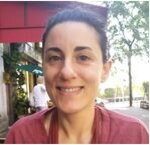Chargé de recherche CNRS

email: figliola@unistra.fr
Google Scholar, ResearchGate, LinkedIn, ORCID: 0000-0001-7299-1083
Research building R3, Floor 2, Office 4
Vous êtes ici :

email: figliola@unistra.fr
Google Scholar, ResearchGate, LinkedIn, ORCID: 0000-0001-7299-1083
Research building R3, Floor 2, Office 4
Medicinal chemistry, selective photodynamic therapy, organic and stimuli-responsive photosensitizers, fluorophores, singlet oxygen/triplet excited state emission, molecular engineering, boron complexes, pyrrole-based bioinspired molecules
My research goal is the design, synthesis and study of activable and disease-directed photosensitizers to perform efficient antimicrobial and anticancer photodynamic therapy. Photodynamic therapy (PDT) is a photochemistry-based medical treatment using the light at a specific wavelength, a photosensitizer (PS) and molecular oxygen. The absorption of the light by the PS produces the reactive oxygen species, including singlet oxygen, both causing cell death followed by an inflammatory and immune response. PDT has been known for over 30 years as a promising anticancer and antimicrobial treatment, because it gives better outcomes in terms of systemic side effects and it reduces the development of microbial resistance, respectively. To accomplish these goal, new scaffolds are explored as potential PS and they are based either on boron complexes, such as BODIPYs and BF2-DIPYRs, or on the bioinspired structure. Molecular engineering of the above scaffolds is performed to draw a clear structure-activity relationship for an optimized PDT activity. Subsequently, the most promising PS are modified to be responsive to stimuli, such as the acidic pH or the high concentration of glutathione and directed to the targeted disease. Each synthetic structural modification is accompanied by photophysical studies thanks to the extensive equipment in the laboratory as well as theoretical and biological evaluation thanks to the established collaborations with Pr. Denis Jacquemin (Université de Nantes), specialist in ab initio calculation, and with Pr. Pascal Didier (Université de Strasbourg) and Dr. Halina Anton (Université de Strasbourg) for in vitro experiments.